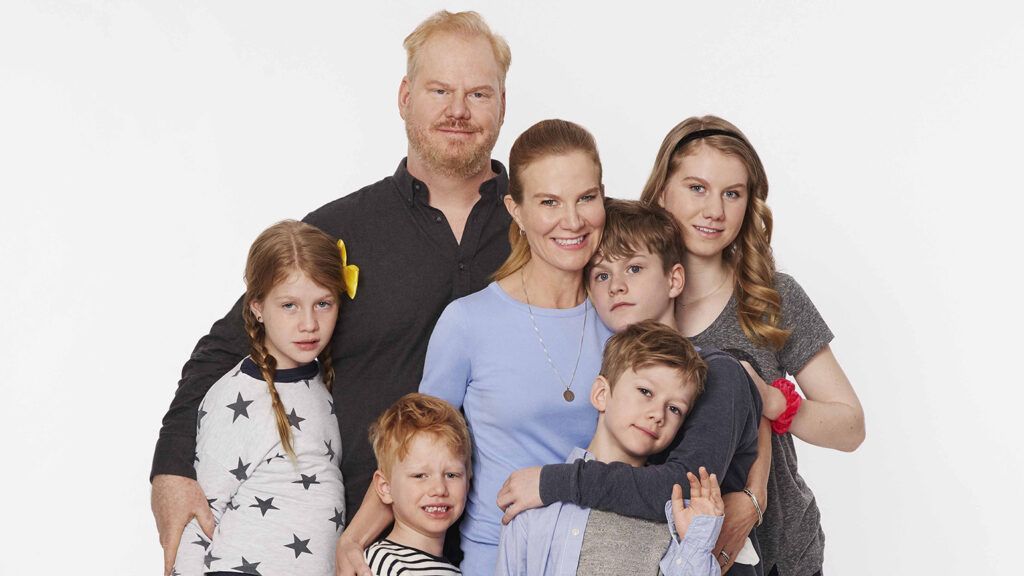A knock on the door. My hand squeezed Jim’s. This is really happening. A serious-looking woman entered the hospital’s pre-op area.
“Hi, I’m one of the surgeons,” she said. “I want to go over the procedure with you.” She explained how she would put some wirelike thing through a vein in my thigh and thread it all the way to my brain, where she would then cauterize the blood vessels feeding the tumor, all to reduce the risk of bleeding for the main act—the craniotomy and removal of the tumor—the next day. “Do you have any questions?” she said.
“I have five children at home,” I said, before realizing that wasn’t actually a question. My mind was still on the end-of-life directives I’d signed minutes earlier. “The thing is, they really need me.”
“Absolutely,” the surgeon said.
I turned to Jim, my husband of 13 years, a standup comedian, my writing partner and father to Marre, Jack, Katie, Michael and Patrick. All I could think was: God help them if I die. I believe in a God of miracles, but at that moment in April 2017, I couldn’t imagine them surviving without me, even with the Almighty’s help.
“Here’s my computer password,” I told Jim. “And the code to unlock my phone.” Somehow that seemed like the most critical info to share. He had no clue how to manage our household, the stuff I took care of without him ever realizing. He didn’t know the kids’ teachers’ names. Or the after-school schedule. How to order groceries. “All the foods we order will be highlighted on the FreshDirect website,” I told him.
Jim looked back at me with watery eyes. Was he having allergies? Had I remembered to bring the Claritin?
He and I had first met when I literally ran into him at a Korean market near where we both lived, as if in some bad romantic comedy. “We’re probably going to get married,” Jim had said. Two years later, we were. I dragged him to Mass. Jim had grown up Catholic too, but I was the one who carried a rosary everywhere I went.
We started working together. I’d never clicked with anyone like this. He was the one on stage, but creating his stage persona as a couple, watching him deliver lines I wrote, was a huge rush. His success was my success.
Behind the scenes, the kids started coming in 2005. At times, I felt like the most consistently pregnant woman in New York City. We worked the whole family thing into the act. But juggling all those pediatrician appointments, parent-teacher meetings and afterschool activities while still focusing on Team Jim was like walking a tightrope while juggling cats.
In 2015, we launched The Jim Gaffigan Show on TV. I was an executive producer. After two seasons, I was exhausted. It struck me that the time I was taking to write about being the mother of five children was taking the place of actually being a mother of five children.
“Do we want 10 seasons of an amazing show and miss them growing up, or do we want to stop at two great seasons and have amazing kids?” I asked Jim. We ended the show and set up a home office for both of us.
I had charts with every appointment, every activity, color-coded by child. Everything under control. Sure, I had throbbing headaches and trouble hearing out of my left ear. I didn’t have time for this. I pushed myself harder. Finally, at the recommendation of the kids’ pediatrician, to whom I’d admitted not being able to hear, I squeezed in an MRI.
The findings had brought us here: A large pear-shaped tumor was pressing against my brain stem. “You need surgery immediately,” the neurosurgeon said. The one thing I had no plan for. Suddenly, getting to the hospital was all that mattered.
Now, in pre-op, Jim wiped his eyes and kissed me. A nurse wheeled me into the OR. I was mostly out of it for the next two days. I regained consciousness in the ICU, a tube down my throat. Something up my nose. More tubes coming out of my arms. Jim was there. He looked terrified. He turned to talk to a doctor, but with all the medication I was on I couldn’t grasp what anyone was saying. What’s wrong? Later I learned that, while the tumor had been successfully removed and wasn’t cancerous, I had aspirated saliva in my sleep and contracted a serious case of bilateral pneumonia.
On top of that, I wouldn’t be able to speak or swallow, not even a sip of water, while my brain stem healed from the surgery. My body was so weak, i could barely move. But my brain was in overdrive. Who was checking on Marre and making sure she wasn’t on her phone but doing her homework? Family and friends were watching the kids when Jim was with me, but they didn’t know my routine. Did I tell someone to put a Pull-Up on Patrick before bed? Did Jim remember the Xbox had to be locked up so Jack wouldn’t be on it all week?
I couldn’t tell anyone; I couldn’t talk. It was maddening. The pneumonia was making me sicker. A suction tube in my mouth made sure not a single drop of saliva could escape. The breathing tube made me feel as if I were suffocating. The kids weren’t allowed in the ICU. I missed them. And I worried they were trashing our house. I felt helpless. I wanted to scream. But of course I couldn’t.
I was praying as I never had before. Why wasn’t God responding? I was doing my part. What was the holdup?
After about a week, my brother Paul brought me a clipboard and a black Sharpie. I grabbed the pen and wrote a long list of instructions. When I was done, I showed it to Jim. He squinted. “What is this?” he said.
I looked at what I’d written. With my brain stem still healing, my hand-eye coordination was a mess. My list was totally incomprehensible. I couldn’t stand it. I threw the clipboard against the wall. “I know this is awful for you,” Jim said. “But the kids and I are handling things at home. Seriously. That’s the last thing you need to worry about right now.”
My eyes met his. Who was he kidding? I pictured piles of pizza boxes scattered about the apartment. The sink full of dishes. Dirty laundry everywhere. That wasn’t what bothered me most. I missed the little rug rats, their hugs with their greasy, grimy fingers, their hair that forever needed combing, Katie’s riddles that made no sense, Marre’s stories that went on and on. Things I’d so often thought as annoyances, keeping me from getting the work of being a mother done.
Slowly I grew well enough to stand and walk short distances with the help of a physical therapist. But I still couldn’t eat or drink. The trach in my throat kept me from speaking. Every day, Jim came to visit and assured me he had things under control. He went over the plans for the week, what each of the kids was doing. He’d mastered the after-school schedule. On top of that, he’d made a detailed chart for when friends and family should visit each day, so I was never alone. This man who had made being a sloth into an art form. I saw him in an entirely new light. Like Winston Churchill in his war room. Only funnier.
After about three weeks, I was strong enough to leave the hospital and come home. But I was mostly confined to bed. Still eating through a tube, breathing with the help of a machine.
Jim, along with Sister Mary (a nun who happens to be an RN and a dear friend), led me into our apartment and to my waiting bed. The kids were out, so I could get settled first. Finally I heard the familiar sounds of their arrival. But I had to wait while they each took showers, per doctor’s orders, for infection control.
At last, the five of them stood awkwardly in front of my bed. A feast for my eyes. Seven-year-old Katie was like Florence Nightingale, concerned about my temperature, my comfort. My four- and five-year-olds, Patrick and Michael, carried toy doctor kits and used their plastic instruments to assess my condition. Then they brought in gigantic shiny helium balloons that spelled out WE LOVE U!
I was back. Not as executive producer of Team Gaffigan. But I didn’t care. At least not the way I would have before the tumor. I was surrounded by love and family, and that’s all that mattered. It had taken me literally not being able to move for God to get my attention, to show me my kids didn’t need me to be the family showrunner. They needed a mom who would listen to their rambling stories, who would cuddle with them or watch a favorite TV show together. Go on a picnic in the park. Play Legos. Just be with them. I was ready to get started.
But first I had to get well enough to get out of bed by myself, to breathe on my own. That took weeks—a long, frustrating wait I didn’t handle with grace. But every day I was reminded of how the kids were stepping up, helping with chores I had never delegated to them. Laundry was getting done. Meals were being made. Jim even let the older kids go on outings alone, taking the subway. Something I never let them do.
So many times I wanted to take charge again, to direct the action, but I couldn’t. Instead, I had to let go. It wasn’t only my body that was getting stronger but my will, my desire, to make a change. To heal, not only physically but spiritually, and learn to trust God fully.
Finally I was able to get about and speak again. My occupational therapist told me I was ready for something more challenging. “Take on something meaningful to you,” she said.
I thought for a moment. There was so much I wanted to get to. “Can I clean out my basement?” I said.
“I was thinking more like making breakfast for your kids,” she said.
Duh. The kids. I could see God looking down on me, thinking: What is it going to take for this woman to get it?
I went to the fridge, got out a carton of eggs and began cracking them into a pan. I only lightly stir my scrambled eggs so they come out with big pockets of yolk and a few white pieces. This was my first time cooking since the tumor. Soon the apartment was filled with smell of cooking eggs and Katie sauntered into the kitchen.
“Mommy, I love the way you make scrambled eggs,” she said. “You don’t make little crumbles like everybody else does.”
I beamed. “Katie, would you like me to teach you how to make them?” She pulled up a chair next to the stove. I showed her how to crack the eggs, then push the edges into the middle of the pan and fold them on top of each other. She quickly mastered it. Wonderful. Lesson finished.
“Mom, now can you teach me how to make a sunny-side up?” she asked. In my mind, I heard what I would have said pre-tumor, What do you think this is, Denny’s? I have to clean out the basement.
“I’d love to,” I said. And that’s what we did.
For more inspiring stories, subscribe to Guideposts magazine.





